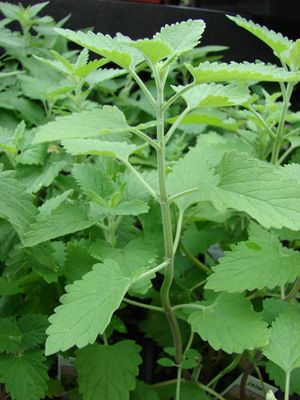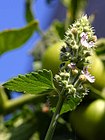Note: This is a project under development. The articles on this wiki are just being initiated and broadly incomplete. You can Help creating new pages.
Difference between revisions of "Nepeta cataria - Catnip"
(→List of Ayurvedic medicine in which the herb is used) |
|||
| (30 intermediate revisions by 3 users not shown) | |||
| Line 1: | Line 1: | ||
[[File:Starr 070906-8819 Nepeta cataria.jpg|thumb|right|Catnip leaves]] | [[File:Starr 070906-8819 Nepeta cataria.jpg|thumb|right|Catnip leaves]] | ||
| − | '''Nepeta cataria''', commonly known as catnip, catswort, or catmint, is a species of the genus Nepeta in the family Lamiaceae, native to southern and eastern Europe, the Middle East, central Asia, and parts of China | + | '''Nepeta cataria''', commonly known as catnip, catswort, or catmint, is a species of the genus Nepeta in the family Lamiaceae, native to southern and eastern Europe, the Middle East, central Asia, and parts of China. |
| − | == Uses == | + | ==Uses== |
| + | {{Uses|Motion sickness}}, {{Uses|Fever}}, {{Uses|Cold}}, {{Uses|Headache}}, {{Uses|Migraine}}, {{Uses|Anxiety}}, {{Uses|Stress}}, {{Uses|Diarrhea}}, {{Uses|Hysteria}}<ref name="Uses"/> | ||
| − | + | ==Parts Used== | |
| − | + | {{Parts Used|Leaves}}. | |
| − | |||
| − | == | + | ==Chemical Composition== |
| + | Nepetalactones 4aα, 7α, 7aα-nepetalactone; 3,4β-dihydro-4aα, 7α, 7aα-nepetalactone; 4aα, 7α, 7aβ-nepetalactone and β-caryophyllene, five new constituents were identified: dimethyl-3,7 oxa-1 bicyclo [3,3,0] oct-2-ene, piperitone, thymol methyl ether, hexenyl benzoate and humulene oxide<ref name="chemical composition"/> | ||
| − | + | ==Common names== | |
| + | {{Common names|kn=|ml=|sa=|ta=|te=|hi=|en=Catnip, Catmint}} | ||
| + | ==Properties== | ||
| + | Reference: Dravya - Substance, Rasa - Taste, Guna - Qualities, Veerya - Potency, Vipaka - Post-digesion effect, Karma - Pharmacological activity, Prabhava - Therepeutics. | ||
| + | ===Dravya=== | ||
| + | |||
| + | ===Rasa=== | ||
| + | |||
| + | ===Guna=== | ||
| + | |||
| + | ===Veerya=== | ||
| + | |||
| + | ===Vipaka=== | ||
| + | |||
| + | ===Karma=== | ||
| + | |||
| + | ===Prabhava=== | ||
| + | |||
| + | ==Habit== | ||
| + | {{Habit|Perennial herb}} | ||
| + | |||
| + | ==Identification== | ||
| + | ===Leaf=== | ||
| + | {{Leaf|Simple|long-stemmed|Opposite, long-stemmed. Blade cordate–ovate, with tapering tips, hairy, large-toothed. inflorescence’s lowest subtending bracts similar to stem leaves, upper ones small, narrow}}<ref name="Leaf"/> | ||
| + | |||
| + | ===Flower=== | ||
| + | {{Flower|Unisexual||white with red spots|Stamens 4|Flowering time is July–August and these are Corolla irregular}} | ||
| + | |||
| + | ===Fruit=== | ||
| + | {{Fruit|schizocarp||Flowering time is september to december|With hooked hairs|}} | ||
| + | |||
| + | ===Other features=== | ||
| + | |||
| + | ==List of Ayurvedic medicine in which the herb is used== | ||
| + | |||
| + | ==Where to get the saplings== | ||
| + | ==Mode of Propagation== | ||
| + | {{Propagation|Seeds}}. | ||
| + | |||
| + | ==How to plant/cultivate== | ||
| + | Nepeta cataria is cultivated as an ornamental plant for use in gardens. It is also grown for its attractant qualities to house cats and butterflies. The plant is drought-tolerant and deer-resistant. It can be a repellent for certain insects, including aphids and squash bugs. Catnip is cultivated in drained soils, enriched with peat and manure<ref name="How to plant/cultivate"/> | ||
| + | |||
| + | ==Commonly seen growing in areas== | ||
| + | {{Commonly seen|Yards}}, {{Commonly seen|Waste ground}}, {{Commonly seen|Roadsides}}, {{Commonly seen|Ruins}}. | ||
| + | |||
| + | ==Photo Gallery== | ||
| + | <gallery class="left" caption="" widths="140px" heights="140px"> | ||
| + | 2015.08.22 10.09.05 DSC00158 - Flickr - andrey zharkikh.jpg | ||
| + | |||
| + | |||
| + | 2015.08.22 10.39.12 DSC00188 - Flickr - andrey zharkikh.jpg | ||
| + | |||
| + | |||
| + | 2015.08.22 10.39.41 IMG 0246 - Flickr - andrey zharkikh.jpg | ||
| + | |||
| + | 2015.08.22 10.40.09 IMG 0247 - Flickr - andrey zharkikh.jpg | ||
| + | |||
| + | British Entomology Volume 7 (John Curtis) Plate 500.jpg | ||
| + | |||
| + | |||
| + | Cataire FR 2013.jpg | ||
| + | |||
| + | |||
| + | Catnip , Nepeta cataria.jpg | ||
| + | |||
| + | |||
| + | Catnip flowers.jpg | ||
| + | |||
| + | |||
| + | Catnip leaves flowers.jpg | ||
| + | |||
| + | </gallery> | ||
| + | |||
| + | ==References== | ||
| + | |||
| + | <references> | ||
| + | <ref name="chemical composition">[https://www.tandfonline.com/doi/abs/10.1080/10412905.1993.9698195 "Chemical Constituents"]</ref> | ||
| + | |||
| + | <ref name="Leaf">[http://www.flowersofindia.net/catalog/slides/Catnip.html "leaves description"]</ref> | ||
| + | |||
| + | <ref name="How to plant/cultivate">[http://nepetacataria.org/ "History and Description"]</ref> | ||
| + | |||
| + | <ref name="Uses">[http://www.medicalhealthguide.com/herb/catnip.htm "Catnip Health Benefits"]</ref> | ||
| + | </references> | ||
| + | |||
| + | ==External Links== | ||
| + | * [http://www.missouribotanicalgarden.org/PlantFinder/PlantFinderDetails.aspx?kempercode=e433 Nepeta cataria on missouribotanicalgarden] | ||
| + | * [http://eol.org/pages/595653/overview Nepeta cataria on encyclopedea of life] | ||
| + | * [https://www.pfaf.org/user/Plant.aspx?LatinName=Nepeta+cataria Nepeta cataria as a future plant] | ||
| + | * [http://nepetacataria.org/nepeta-cataria-effects-on-humans/ Nepeta Cataria Effects on Humans] | ||
[[Category:Herbs]] | [[Category:Herbs]] | ||
| + | [[Category:Ayurvedic herbs that don't have seed photos]] | ||
| + | [[Category:Lamiaceae]] | ||
Latest revision as of 09:57, 11 June 2019
Nepeta cataria, commonly known as catnip, catswort, or catmint, is a species of the genus Nepeta in the family Lamiaceae, native to southern and eastern Europe, the Middle East, central Asia, and parts of China.
Contents
- 1 Uses
- 2 Parts Used
- 3 Chemical Composition
- 4 Common names
- 5 Properties
- 6 Habit
- 7 Identification
- 8 List of Ayurvedic medicine in which the herb is used
- 9 Where to get the saplings
- 10 Mode of Propagation
- 11 How to plant/cultivate
- 12 Commonly seen growing in areas
- 13 Photo Gallery
- 14 References
- 15 External Links
Uses
Motion sickness, Fever, Cold, Headache, Migraine, Anxiety, Stress, Diarrhea, Hysteria[1]
Parts Used
Chemical Composition
Nepetalactones 4aα, 7α, 7aα-nepetalactone; 3,4β-dihydro-4aα, 7α, 7aα-nepetalactone; 4aα, 7α, 7aβ-nepetalactone and β-caryophyllene, five new constituents were identified: dimethyl-3,7 oxa-1 bicyclo [3,3,0] oct-2-ene, piperitone, thymol methyl ether, hexenyl benzoate and humulene oxide[2]
Common names
| Language | Common name |
|---|---|
| Kannada | |
| Hindi | |
| Malayalam | |
| Tamil | |
| Telugu | |
| Marathi | NA |
| Gujarathi | NA |
| Punjabi | NA |
| Kashmiri | NA |
| Sanskrit | |
| English | Catnip, Catmint |
Properties
Reference: Dravya - Substance, Rasa - Taste, Guna - Qualities, Veerya - Potency, Vipaka - Post-digesion effect, Karma - Pharmacological activity, Prabhava - Therepeutics.
Dravya
Rasa
Guna
Veerya
Vipaka
Karma
Prabhava
Habit
Identification
Leaf
| Kind | Shape | Feature |
|---|---|---|
| Simple | long-stemmed | Opposite, long-stemmed. Blade cordate–ovate, with tapering tips, hairy, large-toothed. inflorescence’s lowest subtending bracts similar to stem leaves, upper ones small, narrow |
Flower
| Type | Size | Color and composition | Stamen | More information |
|---|---|---|---|---|
| Unisexual | white with red spots | Stamens 4 | Flowering time is July–August and these are Corolla irregular |
Fruit
| Type | Size | Mass | Appearance | Seeds | More information |
|---|---|---|---|---|---|
| schizocarp | Flowering time is september to december | With hooked hairs | {{{6}}} |
Other features
List of Ayurvedic medicine in which the herb is used
Where to get the saplings
Mode of Propagation
How to plant/cultivate
Nepeta cataria is cultivated as an ornamental plant for use in gardens. It is also grown for its attractant qualities to house cats and butterflies. The plant is drought-tolerant and deer-resistant. It can be a repellent for certain insects, including aphids and squash bugs. Catnip is cultivated in drained soils, enriched with peat and manure[4]
Commonly seen growing in areas
Yards, Waste ground, Roadsides, Ruins.
Photo Gallery
- 2015.08.22 10.09.05 DSC00158 - Flickr - andrey zharkikh.jpg
References
External Links
- Pages with broken file links
- Ayurvedic Herbs known to be helpful to treat Motion sickness
- Ayurvedic Herbs known to be helpful to treat Fever
- Ayurvedic Herbs known to be helpful to treat Cold
- Ayurvedic Herbs known to be helpful to treat Headache
- Ayurvedic Herbs known to be helpful to treat Migraine
- Ayurvedic Herbs known to be helpful to treat Anxiety
- Ayurvedic Herbs known to be helpful to treat Stress
- Ayurvedic Herbs known to be helpful to treat Diarrhea
- Ayurvedic Herbs known to be helpful to treat Hysteria
- Herbs with Leaves used in medicine
- Herbs with common name in English
- Habit - Perennial herb
- Index of Plants which can be propagated by Seeds
- Herbs that are commonly seen in the region of Yards
- Herbs that are commonly seen in the region of Waste ground
- Herbs that are commonly seen in the region of Roadsides
- Herbs that are commonly seen in the region of Ruins
- Herbs
- Ayurvedic herbs that don't have seed photos
- Lamiaceae








